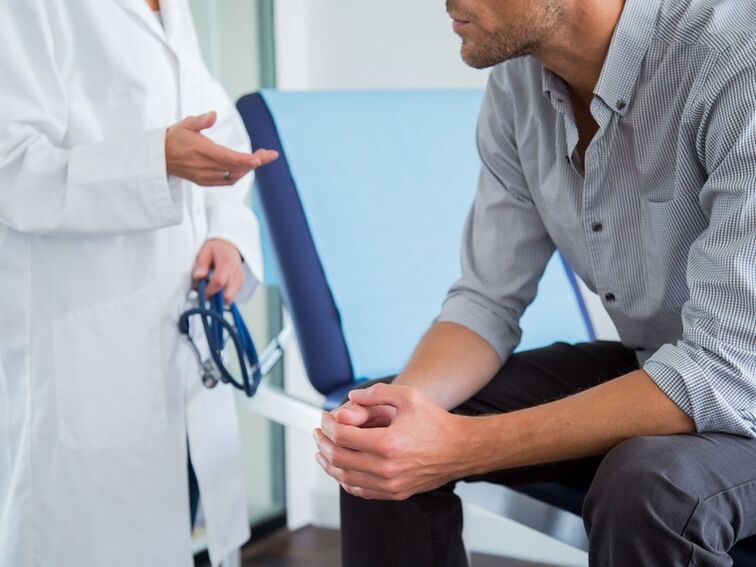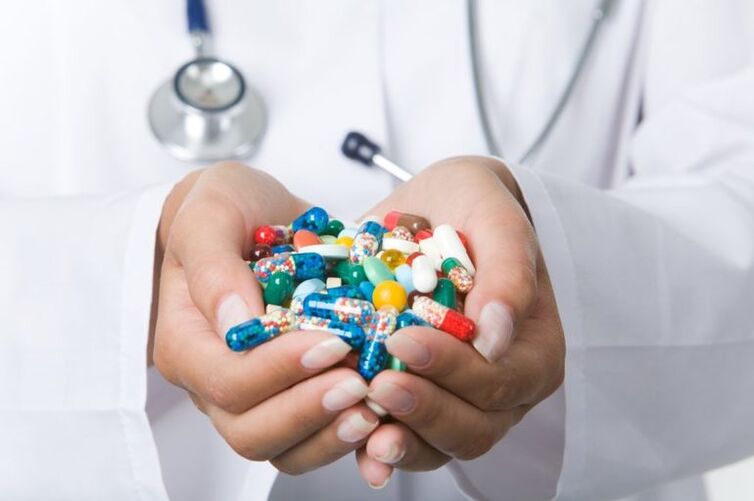Inflammation of the prostate gland, that is, prostate, regardless of the cause of the disease, as a rule, acquires a chronic course. In order for the effective treatment of chronic prostatitis to be achieved, you need to know for what reasons it appears.

Good health, dear readers. In touch, Alexander Burusov is an expert at the Viva Man Men's Club, and we continue to understand the problem of chronic prostatitis, its causes, symptoms and treatment options.
In this article, we will try to figure out what is better to treat this terrible ailment, what options are at our disposal. Let's begin to analyze the most modern and most effective methods for treating prostatitis in men.
What is prostatitis?
Prostatitis is called inflammation of the prostate gland. It can occur as a result of weakening of immunity, infection, hypothermia, stress, inactive lifestyle, active or, conversely, irregular sex life, entering the body.
The prostate iron or prostate is part of the male reproductive system. It is the basis of the urethra. The size of the prostate can be compared with the size of the walnut. The main function of this organ is the development of a secret that is responsible for the activity of spermatozoa.
There are 4 types of disease:
- Chronic bacterial.
- Chronic, not associated with the development of bacteria.
- Chronic asymptomatic.
- Spicy.
All other types of prostatitis do not have pronounced manifestations, so diagnosing them is always difficult. The main symptoms of chronic types of disease include:

- Pain in the lower abdomen (can be given to the back).
- Discharge from the urethra (can be transparent or purulent).
- Sexual function disorders.
- Far -hearted urination.
Prostatitis can occur asymptomatic and is diagnosed only on the basis of test results. He can arise in a man over 25 years old. After 35 years, the risk of its development increases significantly, and in 45-year-olds, the probability of diagnosing prostatitis is 50%. Therefore, in adulthood, it is necessary to conduct an examination of the urologist annually, which will help detect the disease at an early stage and start treatment in time.
Diagnosis of the disease
Only a urologist is able to determine the presence of prostatitis. After inspection, he can appoint an additional examination:
- Physical examination is a palpation of a prostate, during which it is possible to determine the condition and size of the gland.
- Transrectal ultrasound.
- Analysis of the smear or secret of the prostate for the presence of leukocytes and bacteria.
- Clinical urine analysis in which protein, leukocytes and bacteria can be found.
- Ejaculate analysis.
- Cytological urine analysis.
- Bacteriological urine analysis.
- Analysis of the level of protein of the dog.
- Urodynamic study.
- Cytoscopy. It can only be assigned if there are indications, in case of injury or in preparation for the operation.
Causes and exacerbation of the disease
Inflammatory diseases of the genitourinary system, rectum, due to close contact with the prostate gland, lead to the formation of the inflammatory focus in it. The vessels that feed the prostate are the branches of the artery of the bladder, rectum, the posterior sacral artery, the deep artery of the thigh. Any infectious focus available in these organs can fall into the iron.

The presence of a chronic infection of any localization, for example, the sinuses of the nose, leads to a weakening of immunity, and conditionally pathogenic microorganisms available on the skin, in the intestines, urethra - become pathogenic. This leads to the development of the chronic process.
Violation of the circulatory of the prostate gland due to stagnation of blood against the background of reduced physical activity leads to a deterioration in the flow of drugs to the prostate gland and complicates the treatment of chronic prostatitis in men.
The increase in blood flow to the organs located in the pelvis occurs not only due to low physical activity, but also from a number of factors:
- irregular sex life;
- interruption of sexual intercourse;
- smoking, alcohol;
- varicose veins of the lower extremities;
- paraproctitis and proctitis;
- thrombophlebitis hemorrhoidal veins against the background of chronic hemorrhoids;
- cracks and fistulas of the anus;
- The tone of the vascular wall is regulated by the sympathetic and parasympathetic nervous system, with the disease of which the flow and outflow of blood from the organ is disturbed;
- A trauma to the crotch among riders, cyclists, motorcyclists.
With urogenital infections transmitted sexually, the disease does not always manage to finally cure - this is the cause of the development of chronic prostatitis. The most frequent pathogens are:
- Trichomonas;
- mycoplasmas;
- gonococci;
- Gardnerella;
- ureaplasma;
- chlamydia;
- mushrooms;
- viruses;
- E. coli;
- streptococci;
- Enterococci;
- Staphylococci.

These microorganisms are difficult to cure.
Hormonal activity after 40 years in a man gradually begins to fade away. At first it flows asymptomatic.
A decrease in the production of testosterone over and over again leads to a slight stagnation of the secretion of the prostate gland in its granules. Little by little, this stagnation increases. Substances contained in the secret of prostates are not completely removed. The secretory, motor, barrier function of the secretion of the prostate gland begins to suffer.
Cymonic acid in prostatic juice performs a bactericidal function, dilutes it. With stagnation of citric acid is not enough, a bacterial infection begins to develop. The level of citric acid in prostatic juice is directly interconnected with the amount of testosterone in the blood.
Clinical picture of the disease
Symptoms of chronic prostatitis in men:
- sensations of discomfort, pain over the pubis;
- The pain shoots periodically in the rectum and sacrum;
- increased urination and pain, especially after hypothermia, stress;
- uncharacteristic discharge;
- violations of the ejaculation, erection;
- premature ejaculation;
- increased sweating;
- impaired sleep;
- Periodic increase in body temperature no more than 37. 2-37. 3 0 C in the evening.

From what symptoms prevail: pain, urination or sexual dysfunction - the treatment of chronic prostatitis in men depends.
The main components of the treatment of the disease
It is necessary to highlight the main areas of treatment:
- medicines;
- normalization of the regime of work and rest;
- rational nutrition;
- rejection of bad habits;
- Physoalization, massage;
- Folk remedies.
Drug treatment
Effective treatment of prostatitis should be aimed at eliminating the cause of prostatitis. Medications are selected individually by a doctor after performing the necessary diagnostic studies. Let's analyze how and how to treat prostatitis if it has already acquired a chronic form. The main directions of drug therapy:
- antibiotics;
- anti -inflammatory drugs;
- antispasmodics to improve the outflow of urine;
- Urantiseptics to eliminate infections of the urinary system;
- preparations that improve arterial and venous bloodstreams;
- Medications that improve fluidity, reducing blood viscosity;
- vitamins;
- enzymes;
- sedatives, psychotherapeutic effects;
- correction of immune disorders;
- Treatment of metabolic diseases and hormonal dysfunction.
Antibacterial therapy
Whether we cure chronic prostatitis, will depend on well -chosen antibacterial therapy. It is important to note that therapy and treatment of prostatitis will be as effective as possible only in case of proper determination of the type and stage of the disease.
Antibiotics are selected by those that penetrate the prostate well, effectively act on the pathogen. Some pathogens of chronic prostatitis, such as ureaplasma, are not sensitive to such strong drugs as:

- tetracycline;
- some cephalosporins;
- levofloxacin;
- Clarithromycin.
Non -steroidal anti -inflammatory drugs
The effect of non -steroidal anti -inflammatory drugs (NSAIDs) is associated with the normalization of the permeability of the vascular wall, the restoration of microcirculation. They reduce education and do not allow the existing inflammation mediators to be absorbed. We must remember the property of NSAIDs, form ulcers in the stomach and duodenum.
It is most rational to use rectal candles with NPS, such as indomethacin.
Normalization of blood flow with drugs
Normal blood flow is achieved with an adequate diameter of arteries that bring blood to veins, which are out of the blood outflow of oxygen. It is also necessary to reduce blood viscosity and achieve its good fluidity in the capillary channel.
To achieve a good result in the treatment of chronic diseases of the prostate, it is necessary to treat inflammatory diseases of the urethra, bladder and kidneys. For this purpose, drugs are used:
Prostatitis inevitably reduces potency, weakens libido, disrupts the erection. These phenomena are always accompanied by symptoms of dysphoria, reduced mood background, and mood swings. With these symptoms, sedative, anxiolytics, and antidepressants are prescribed.
Phytotherapy
It is known that herbal medicine is an alternative to the use of medicines in the treatment of many diseases. Is it possible to cure prostatitis with its help? Very often, to improve metabolic processes in the prostate, doctors recommend using medicinal herbs (licorice, nettles, peony, plantain, St. John's wort, etc. ). All these plants contain a lot of selenium and zinc. However, they need to be used only as part of complex therapy. As a rule, decoctions of these herbs are used for baths.
Physiotherapeutic influences
The following treatment methods for the chronic process are used to influence the prostate:

- ultrasound
- electrophoresis;
- Baths with hot water with decoctions of chamomile, linden, sage, thyme;
- Warm enemas
- prostate massage through the rectum;
- Hirudotherapy
- UHF;
- inductothermia;
- microwave resonance therapy.
The degree of severity of psychological deviations and depressive manifestations depends on how much chronic prostatitis is treated. To accelerate the process to treatment, in the absence of contraindications, physiotherapeutic methods of exposure must be added.
Nutrition recommendations
Standard recommendations for all chronic diseases in the form of refusal of fried, salty, praised, smoked in this situation are insufficient. Effective treatment of prostatitis depends on rational, balanced nutrition. It is necessary to add such foods as celery, ginger, turmeric, apibodes.
They contain:
- silicon, which normalizes the formation of hormones in the body;
- B vitamins, remove toxins and restore redox processes;
- Chrome, germanium, selenium, zinc normalize the work of a sympathetic and parasympathetic system;
- Vitamins C, and normalize the permeability of the cell membrane, have antioxidant properties;
- Extremely amino acids, omega 3, which rejuvenate sexual function.
Apitherapy uses: natural honey, peg, purse, royal jelly, dead bees, bee pollen.
Folk treatment
The course of treatment of chronic prostatitis is mandatory complemented by medicinal herbs, which should take into account all these mechanisms for the development of the disease. Then the effect of therapy will be achieved in full.
It is possible to use the following medicinal herbs:
- nettle, sage, stubborn;
- mint, plantain, hernica;
- rosehip, yarrow, wormwood;
- thyme, birch buds, linden flowers;
- Successful drowned, chamomile, motherwort.
The cure of chronic prostatitis depends on the prolonged use of medicinal herbs according to the scheme in combination with controversial courses of drug therapy.

Decoctions are used, infusions for oral administration, for baths, for microclem. Applying tinctures, that is, alcohol -containing drugs are not recommended. This prevents the successful treatment of chronic urogenital diseases.
All these drugs give a good effect in the treatment of prostatitis in inflammatory, stagnant, hormonal etiology.
Prevention
The better to cure prostatitis will tell a urologist after examining the patient. But, like any other disease, prostatitis is easier to prevent than to get rid of the consequences of the disease. This is necessary:
- Lead an active lifestyle. Regular sports prevents stagnant phenomena in the pelvis and improve blood circulation. A good effect has: swimming, sports walking, dancing, fitness. At the same time, power sports should be avoided.
- Ensure proper nutrition. It is worth limiting the amount of fried, salty, fatty, spicy, pickled and smoked food. The basis of the diet should be: fresh vegetables and fruits, dairy products, cereals. It is important to adhere to the drinking regime.
- Avoid random sexual relations.
- Maintain a regular sex life. For a middle -aged man, the norm is sex several times a week. This contributes to the natural massage of the prostate gland, which significantly reduces the risk of propagation in it of various bacteria.
- It is important to avoid hypothermia.
- Annually, it is necessary to undergo an examination by a urologist.
After 35 years, each man is obliged to monitor his health, since during this period the risk of prostatitis is increasing. In order to prevent the occurrence of the disease, it is important to perform simple preventive measures and regularly undergo a medical examination, which will help identify the pathology at the initial stage when it is easy to treat.






























